Rudd plays Alvin, a comfortably introverted would-be outdoorsman who’s on the job to earn some money while taking time to reflect on his life and his recently rocky relationship with his girlfriend Madison. He’s reluctantly brought along her brother Lance (Hirsch), a talkative though less than eloquent slacker.
Lance is girl-crazy and kinda dumb, but there’s a sweetness to his perspective and lack of basic knowledge of how the world works. Alvin doesn’t see it that way, constantly motivating and correcting Lance, meaning the task is tedious and the conversation one of comically uncomfortable toleration.
Were the film set in the present, these two would have their earbuds in immediately, but Green sets the action in 1988, limiting their ability to distract themselves and disconnect from one another. They have to work, eat and camp together, and the resentment simmers as they fail day and night to find common ground.
Most of the time it’s just them, and Green lets their conversations play naturalistically, sometimes in a single shot. There’s a lot that’s funny while being tinged with something more, be it melancholy, listlessness or fear of the future. Alvin might like to claim the high ground as more mature and more masculine, but Rudd exhibits a yet-unseen vulnerability as he scales back his charming-Everyman quality and betrays Alvin as the lost kid he is inside. Hirsch, too, slips easily into Lance’s skin as a naive goofball actively avoiding his own crisis.
Green’s camera never leaves the forest, carefully attending to the surroundings and the new growth following the fire. Occasionally it leaves the two actors entirely, heading off on some lyrical tangent, collecting captivating shots of Texas wilderness.
Even when sticks close to the isolated twosome, though, the outside world is never far away. It’s present in the letters Alvin writes to Madison, in Lance’s stories of drunken adventures in town, and in the rare but significant human interactions that transpire in the forest. In his last role before passing away, Lance LeGault is a cheerful, slightly pushy truck driver who passes by occasionally to dispense beer and words of wisdom.
If Hirsch’s Lance welcomes those visits, which boost his spirits in the isolation of the forest, Alvin seeks the gratifying clarity and freedom of their solitude. He enjoys being alone in a way Lance can’t understand, dancing and singing by himself in the empty woods when Lance is away for the weekend.
It’s a startling scene when Alvin, believing he’s alone, happens upon a woman looking through the charred remains of her home. He asks her what she’s doing, and in telling him about the search for her pilot’s license, she’s suddenly on the verge of tears. On one level, it’s a reminder for Alvin of the existence of other people’s feelings; on others, it’s a cryptic and incredibly memorable moment of its own, its potential meanings lingering through the rest of the film.
Prince Avalanche speaks insightfully to the joys and costs of being alone, and of the risk that comes with letting another person in. Bittersweet and deeply felt, it also shows with confidence the estimable and still surprising talents of its cast and director. (Recommended)

9(MDAzOTIwODA0MDEyNTA4MTM1OTcyMGJmMA001))

